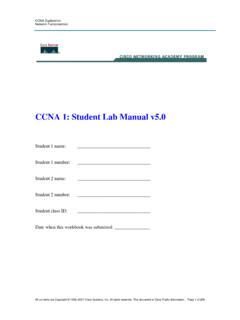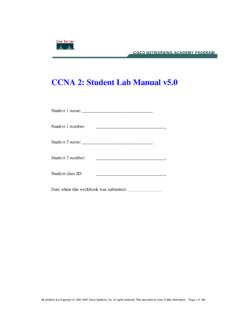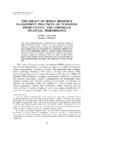Transcription of The role of human resources in ethics/compliance ...
1 The role of human resourcesin ethics / compliance managementA fairness perspective$Gary R. Weavera,*, Linda Klebe Trevin ob,1aDepartment of Business Administration, University of Delaware, Newark, DE, USAbSmeal College of Business Administration, 416 Beam Business Administration Building,Pennsylvania State University, University Park, PA, USAA bstractMany large corporations now have formal programs for managing ethical behavior and legalcompliance. But the often minor role of human resources (HR) in companies' ethics managementefforts is problematic.
2 This is because ethics management efforts are likely to raise questions offairness, and trigger a fairness heuristic among employees that can generate important outcomes for theethics program specifically and the organization generally. Relying on research on fairness inorganizations and corporate ethics practices, we explain why the extensive involvement of HR incorporate ethics programs is important to the perceived fairness, and thus the likely outcomes ( ,employee commitment), of those Elsevier Science Inc.
3 All rights : ethics management ; human resources ; Ethical behaviorDuring the 1990s, many large corporations created formal programs and offices dedicatedto managing ethics and legal compliance . Most American corporations now have a formalethics policy in place (Berenbeim, 1992; Center for Business ethics , 1992), and close to athird of large companies have created formal ethics offices (Weaver, Trevin o, & Cochran,1999a). Meanwhile, the role of `` ethics officer'' has become sufficiently widespread that aprofessional society, the ethics Officer Association, has been suggests that a human resource (HR) orientation often is absent from corporateethics programs.
4 Our aim is to explain why this may be problematic and to recommend how1053-4822/01/$ see front matterD2001 Elsevier Science Inc. All rights : S 1053-4822(00)00043-7$This research was supported in part by the University of Delaware General University Research fund.* Corresponding author. Tel.: (302) 831-4568. Fax.: (302) addresses: ( Weaver), ( Trevin o).1 Tel.: + resource management Review11 (2001) 113 134HR managers can be more involved in corporate ethics initiatives, so that those initiativesachieve their goals of encouraging ethical behavior in organizations.
5 We propose thatemployees' evaluations of fairness, or justice, in the organization are important to achievingvaluable ethics management outcomes, and that the HR function plays a key role in fosteringfairness in the organization generally and in the specific context of ethics programs. Althoughissues of ethics in organization encompass much more than questions of fairness or justice,failure to foster justice in the organization can undermine organizational efforts to encourageethical behavior generally. ethics management , in short, though not the same as fairnessmanagement, depends on careful handling of fairness issues within an , the HR function should play a crucial role in organizations' efforts to dealwith ethical issues, because HR's role is central to the management of fairness incontemporary Status of HR in organizational ethics / compliance programsCorporate ethics programs typically involve many components and initiatives.
6 Andresearch has cataloged these elements (Berenbeim, 1992; Center for Business ethics , 1992;Weaver et al., 1999a). Expectations for ethical behavior typically are communicated toemployees via codes and policy documents, formal training programs, and messages fromsenior management . ethics programs also often provide means for employees to commu-nicate with management , sometimes anonymously through telephone ``hotlines.'' Thesecommunication devices are used for reporting real or perceived ethical or legal problems,to solicit advice and counseling, or both.
7 Also common are procedures for monitoringbehavior so as to reward ethical behavior and/or discipline unethical research suggests that HR staff are merely one among many categories ofcorporate staff who may be involved in managing ethics programs. One study of ethicsprograms in Fortune 500 service and industrial firms found that an HR officer ultimately wasresponsible for ethics / compliance management in 28 percent of responding firms (Weaver,Trevin o, & Cochran, 1999b). But just as many firms (28%) vested responsibility for ethics inlegal positions ( , general counsel), while 16 percent placed responsibility in distinct ethicsor compliance departments, and 11 percent in audit and control functions, with the remainingfirms selecting from among positions such as corporate secretary, public affairs, and corporatecommunications.
8 This study also found that HR and legal departments were involved equallyin ethics training, while legal and audit and control functions dominated investigations ofethical or legal violations. The labeling of many corporate ethics programs also suggests thatlegal concerns often are prominent. At many companies, the effort is referred to as a`` compliance '' program, or an `` ethics and compliance program.'' Similarly, the telephonequery and reporting lines sometimes are labeled in terms of ethics and values, and other timesin terms of compliance and control.
9 Weaver et al. (1999a) report that the majority oftelephone lines in their sample have names suggestive of a legal compliance prominent role of legal and audit staff, and a focus on compliance and control, are notsurprising given that much of the impetus for corporate ethics programs comes from outsideof companies (Weaver et al., 1999a). Federal requirements imposed by the United Weaver, Trevin o / human resource management Review 11 (2001) 113 134114 Sentencing Commission's guidelines for organizational defendants reward organizations thatdevelop and enforce policies and procedures that encourage legal compliance , and thatinvestigate and punish noncompliance.
10 Given that organizations structure themselves inresponse to their external environment (Meyer & Rowan, 1977; Pfeffer & Salancik, 1978),one would expect legal staff to play a prominent role, insuring that company ethics / compliance initiatives satisfy government expectations. Developing rules and policies, andtraining employees on those policies, would seem to be an effective and efficient way tosatisfy not only government expectations, but also to signal responsible intentions to otherexternal observers and critics ( , media organizations).








